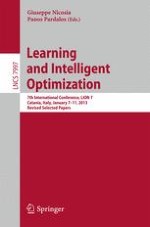2013 | OriginalPaper | Buchkapitel
Multiobjective Evolution of Mixed Nash Equilibria
verfasst von : David Iclănzan, Noémi Gaskó, Réka Nagy, D. Dumitrescu
Erschienen in: Learning and Intelligent Optimization
Verlag: Springer Berlin Heidelberg
Aktivieren Sie unsere intelligente Suche, um passende Fachinhalte oder Patente zu finden.
Wählen Sie Textabschnitte aus um mit Künstlicher Intelligenz passenden Patente zu finden. powered by
Markieren Sie Textabschnitte, um KI-gestützt weitere passende Inhalte zu finden. powered by
